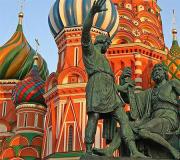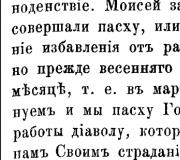The era of the work of woe from wit. Essay: How is the historical conflict of eras reflected in Griboedov’s comedy Woe from Wit
How was the historical conflict of eras reflected in Griboyedov’s comedy “Woe from Wit”?
In the comedy "Woe from Wit" Griboyedov tells the story of the life of noble Moscow in the 19th century. This is the time when the orders of the old, Catherine’s era are changing to a new one, in which a person does not want to put up with the backwardness of the country, wants to serve his homeland without demanding ranks and awards. Chatsky is such a person, and his relationship with Famus society is the main conflict in the comedy.
Representatives of Moscow society are: old woman Khlestova, Prince and Princess Tugoukhovsky, Khryumin, Skalozub, Sophia, Molchalin, Gorich, Zagoretsky, Repetilov and others. The life of this society is busy with dinners, balls, card games and gossip. They oblige and flatter before their superiors, and their attitude towards serfs is very cruel: they are exchanged for dogs, separated from their relatives and sold individually.
The main representative of Moscow society is Famusov. What interests him most about people is their social status. Therefore, for his daughter he wants a husband with “stars and ranks.” In his opinion, Skalozub is ideally suited for this role, who “is both a golden bag and aspires to be a general.” Famusov is not bothered by Skalozub’s mental limitations or his martinet manners. However, despite all her father’s efforts, Sophia chooses Molchalin.
Molchalin is young and energetic, he has his own “philosophy of life” - “to please all people without exception.” Personal gain and self-interest come first for him. He does not have his own opinion on anything: “At my age I should not dare to have my own opinion.” To achieve his goals, Molchalin pretends to be in love with Sophia.
The opposite of Molchalin is Chatsky. Griboedov portrayed Chatsky as a bright representative of the “present century.” A young nobleman, not rich, fairly educated, has his own opinion on many problems of our time. He rebels against serfdom, an empty way of life, unreasonable upbringing, and dishonest service.
But since the rest of the heroes of the comedy belong to the “past century,” they simply do not understand Chatsky. Everything he talks about is alien to Famusov’s society. If for Molchalin it is considered normal to serve others, then Chatsky says: “I would be glad to serve, but being served is sickening.” And if there are people who understand him, for example Gorich, then they are simply afraid to go against public opinion. When society declares Chatsky crazy, he is forced to leave Moscow.
Thus, the nature of the main conflict in the comedy lies in Chatsky’s opposition to Famus society. As a result of this confrontation, Chatsky found himself completely alone. His accusatory monologues do not evoke sympathy among those present, and all of Chatsky’s “million torments” turn out to be in vain. However, it is not. The fact is that in the image of Chatsky, Griboedov portrayed progressive people who want to serve the Fatherland.
In the comedy "Woe from Wit" Griboyedov tells the story of the life of noble Moscow in the 19th century. This is the time when the orders of the old, Catherine’s era are changing to a new one, in which a person does not want to put up with the backwardness of the country, wants to serve his homeland without demanding ranks and awards. Chatsky is such a person, and his relationship with Famus society is the main conflict in the comedy.
Representatives of Moscow society are: old woman Khlestova, Prince and Princess Tugoukhovsky, Khryumin, Skalozub, Sophia, Molchalin, Gorich, Zagoretsky, Repetilov and others. The life of this society is busy with dinners, balls, card games and gossip. They oblige and flatter before their superiors, and their attitude towards serfs is very cruel: they are exchanged for dogs, separated from their relatives and sold individually.
The main representative of Moscow society is Famusov. What interests him most about people is their social status. Therefore, for his daughter he wants a husband with “stars and ranks.” In his opinion, Skalozub is ideally suited for this role, who “is both a golden bag and aims to be a general.” Famusov is not bothered by Skalozub’s mental limitations or his martinet manners. However, despite all her father’s efforts, Sophia chooses Molchalin.
Molchalin is young and energetic, he has his own “philosophy of life” - “to please all people without exception.” Personal gain and self-interest come first for him. He does not have his own opinion on anything: “At my age I should not dare to have my own opinion.” To achieve his goals, Molchalin pretends to be in love with Sophia.
The opposite of Molchalin is Chatsky. Griboedov portrayed Chatsky as a bright representative of the “present century.” A young nobleman, not rich, fairly educated, has his own opinion on many problems of our time. He rebels against serfdom, an empty way of life, unreasonable upbringing, and dishonest service.
But since the rest of the heroes of the comedy belong to the “past century,” they simply do not understand Chatsky. Everything he talks about is alien to Famusov’s society. If for Molchalin it is considered normal to serve others, then Chatsky says: “I would be glad to serve, but being served is sickening.” And if there are people who understand him, for example Gorich, then they are simply afraid to go against public opinion. When society declares Chatsky crazy, he is forced to leave Moscow.
Thus, the nature of the main conflict in the comedy lies in Chatsky’s opposition to Famus society. As a result of this confrontation, Chatsky found himself completely alone. His accusatory monologues do not evoke sympathy among those present, and all of Chatsky’s “million torments” turn out to be in vain. However, it is not. The fact is that in the image of Chatsky, Griboedov portrayed progressive people who want to serve the Fatherland.
One cannot but agree with Goncharov that the figure of Chatsky determines the conflict of comedy - the collision of two eras. It arises because people with new views, beliefs, and goals begin to appear in society. Such people do not lie, do not adapt, and do not depend on public opinion. Therefore, in an atmosphere of servility and veneration, the appearance of such people makes their collision with society inevitable. The problem of mutual understanding of the “present century” and the “past century” was relevant at the time of Griboedov’s creation of the comedy “I’m Burning from Wit,” and it is still relevant today.
So, at the center of the comedy is the conflict between “one sensible person” (according to Goncharov) and the “conservative majority.” It is on this that the internal development of the conflict between Chatsky and the Famus environment surrounding him is based.
“The Past Century” in the comedy is represented by a number of bright images-types. This is Famusova Skalozub, and Repetilov, and Molchalin, and Liza. In a word, there are many of them. First of all, the figure of Famusov, an old Moscow nobleman who has earned general favor in metropolitan circles, stands out. He is friendly, courteous, sharply intelligent, cheerful - in general, a hospitable host. But this is only the external side. The author shows Famusov in every aspect. He also appears as a convinced, fierce opponent of enlightenment. “Take all the books and burn them!” - he exclaims. Chatsky, a representative of the “present century,” dreams of “focusing a mind hungry for knowledge into science.” He is outraged by the order established in Famus society. If Famusov dreams of marrying off his daughter Sophia at a better price (“He who is poor is not a match for you”), then Chatsky longs for “sublime love, before which the whole world... is dust and vanity.”
Chatsky’s desire is to serve the fatherland, “the cause, not the persons.” Therefore, he despises Molchalin, who is accustomed to pleasing “all people without exception”:
To the owner, where will happen live,
To the boss, With by whom will I serve,
Servant his, which cleans dresses,
Doorman, janitor, For avoidance evil,
To the dog janitor, so affectionate was.
Everything in Molchalin: behavior, words - emphasize the cowardice of the immoral careerist. Chatsky speaks bitterly about such people: “Silent people are blissful in the world!” It is Molchalin who arranges his life best of all. In his own way, he is even talented. He earned Famusov's favor, Sophia's love, and received awards. He values two qualities of his character most of all: moderation and accuracy.
In the relationship between Chatsky and Famus society, the views of the “past century” on career, service, and what is most valued in people are revealed. Famusov takes only relatives and friends into his service. He respects flattery and sycophancy. Famusov wants to convince Chatsky to serve, “looking at his elders,” “putting up a chair, raising a handkerchief.” To which Chatsky objects: “I would be glad to serve, but serving is sickening.” Chatsky takes service very seriously. And if Famusov is a formalist and bureaucrat (“it’s written, off your shoulders”), then Chatsky says: “When in business, I hide from fun, when fooling around, I’m fooling around, but mixing these two crafts is there are tons of skilled people, I’m not one of them.” Famusov worries about affairs only on one side: mortally afraid, “so that a lot of them do not accumulate.”
Another representative of the “past century” is Skalozub. This is exactly the kind of son-in-law Famusov dreamed of having. After all, Skalozub is “both a golden bag and aims to be a general.” This character combines the typical features of a reactionary shareholder of Arakcheev’s time. “Wheezing, strangled, bassoon. Constellation of maneuvers and mazurkas,” he is the same an enemy of education and science, like Famusov. “You can’t faint with your learning,” says Skalozub.
It is quite obvious that the very atmosphere of Famus society forces representatives of the younger generation to show their negative qualities. So, Sophia fully corresponds to the morality of the “fathers”. And although she is an intelligent girl, with a strong, independent character, a warm heart, a pure soul, they managed to cultivate many negative qualities in her, which made her part of a conservative society. She does not understand Chatsky, does not appreciate his sharp mind, his logical, merciless criticism. She also does not understand Molchalin, who “loves her because of his position.” The fact that Sophia became a typical young lady of Famus society is her tragedy.
And the society in which she was born and lived is to blame: “She was ruined, in the stuffiness, where not a single ray of light, not a single stream of fresh air penetrated” (Goncharov. “A Million Torments”).
Another comedy character is very interesting. This is Repetilov. He is a completely unprincipled person, an idle talker, but he was the only one who considered Chatsky to be “highly intelligent” and, not believing in his madness, called Famus’s pack of guests “chimeras” and “game.” Thus, he was at least one step above them all.
"So! I have sobered up completely!” - exclaims Chatsky at the end of the comedy.
What is this - defeat or insight? Yes, the ending of this comedy is far from cheerful, but Goncharov is right when he said this: “Chatsky was broken by the quantity of the old force, having dealt it, in turn, a fatal blow with the quality of the fresh force.” And I completely agree with Goncharov, who believes that the role of all Chatskys is “suffering”, but at the same time always “victorious”.
Chatsky opposes the society of ignoramuses and serf owners. He fights against noble scoundrels and sycophants, swindlers, cheats and informers. In his famous monologue “Who are the judges?” he tore off the mask from the vile and vulgar Famus world, in which Then the Russian people turned into an object of purchase and sale, where landowners exchanged human serfs, who saved “both honor and life... more than once,” for “three greyhounds.” Chatsky defends real human qualities: humanity and honesty, intelligence and culture. He protects the Russian people, his Russia from everything inert and backward. Chatsky wants to see Russia enlightened. He defends this in disputes and conversations with all the characters in the comedy “Woe from Wit,” directing all his intelligence, evil, ardor and determination to this. Therefore, the environment takes revenge on Chatsky for the truth, for trying to disrupt the usual way of life. The “past century,” that is, Famus society, is afraid of people like Chatsky, because they encroach on the system of life that is the basis for the well-being of the serf owners. Chatsky calls the past century, which Famusov admires so much, the century of “humility and fear.” The Famus community is strong, its principles are firm, but Chatsky also has like-minded people. These are episodic characters: Skalozub’s cousin (“The rank followed him - he suddenly left the service ...”), the nephew of Princess Tugoukhovskaya. Chatsky himself constantly says “we,” “one of us,” speaking, therefore, not only on his own behalf. So A. S. Griboedov wanted to hint to the reader that the time of the “past century” is passing, and it is being replaced by the “present century” - strong, smart, educated.
The comedy "Woe from Wit" was a huge success. It was sold in thousands of handwritten copies even before it was printed. Progressive people of that time warmly welcomed the appearance of this work, and representatives of the reactionary nobility were outraged. What is this - the collision of the “past century” and the “present century”? Of course yes.
Griboyedov fervently believed in Russia, in his Motherland, and the words written on the writer’s gravestone are absolutely true: “Your mind and deeds are immortal in Russian memory.”
In the comedy "Woe from Wit" Griboyedov tells the story of the life of noble Moscow in the 19th century. This is the time when the orders of the old, Catherine’s era are changing to a new one, in which a person does not want to put up with the backwardness of the country, wants to serve his homeland without demanding ranks and awards. Chatsky is such a person, and his relationship with Famus society is the main conflict in the comedy.
Representatives of Moscow society are: old woman Khlestova, Prince and Princess Tugoukhovsky, Khryumin, Skalozub, Sophia, Molchalin, Gorich, Zagoretsky, Repetilov and others. The life of this society is busy with dinners, balls, card games and gossip. They oblige and flatter before their superiors, and their attitude towards serfs is very cruel: they are exchanged for dogs, separated from their relatives and sold individually.
The main representative of Moscow society is Famusov. What interests him most about people is their social status. Therefore, for his daughter he wants a husband with “stars and ranks.” In his opinion, Skalozub is ideally suited for this role, who “is both a golden bag and aspires to be a general.” Famusov is not bothered by Skalozub’s mental limitations or his martinet manners. However, despite all her father’s efforts, Sophia chooses Molchalin.
Molchalin is young and energetic, he has his own “philosophy of life” - “to please all people without exception.” Personal gain and self-interest come first for him. He does not have his own opinion on anything: “At my age I should not dare to have my own opinion.” To achieve his goals, Molchalin pretends to be in love with Sophia.
The opposite of Molchalin is Chatsky. Griboedov portrayed Chatsky as a bright representative of the “present century.” A young nobleman, not rich, fairly educated, has his own opinion on many problems of our time. He rebels against serfdom, an empty way of life, unreasonable upbringing, and dishonest service.
But since the rest of the heroes of the comedy belong to the “past century,” they simply do not understand Chatsky. Everything he talks about is alien to Famusov’s society. If for Molchalin it is considered normal to serve others, then Chatsky says: “I would be glad to serve, but being served is sickening.” And if there are people who understand him, for example Gorich, then they are simply afraid to go against public opinion. When society declares Chatsky crazy, he is forced to leave Moscow.
Thus, the nature of the main conflict in the comedy lies in Chatsky’s opposition to Famus society. As a result of this confrontation, Chatsky found himself completely alone. His accusatory monologues do not evoke sympathy among those present, and all of Chatsky’s “million torments” turn out to be in vain. However, it is not. The fact is that in the image of Chatsky, Griboedov portrayed progressive people who want to serve the Fatherland.
In the comedy “Woe from Wit” Griboyedov tells the story of the life of noble Moscow in the 19th century. This is the time when the orders of the old, Catherine’s era are changing to a new one, in which a person does not want to put up with the backwardness of the country, wants to serve his homeland without demanding ranks and awards. Chatsky is such a person, and his relationship with Famus society is the main conflict in the comedy.
Representatives of Moscow society are: old woman Khlestova, Prince and Princess Tugoukhovsky, Khryumin, Skalozub, Sophia, Molchalin, Gorich, Zagoretsky, Repetilov and
Other. The life of this society is busy with dinners, balls, card games and gossip. They oblige and flatter before their superiors, and their attitude towards serfs is very cruel: they are exchanged for dogs, separated from their relatives and sold individually.
The main representative of Moscow society is Famusov. What interests him most about people is their social status. Therefore, for his daughter he wants a husband with “stars and ranks.” In his opinion, Skalozub is ideally suited for this role, who “is both a gold bag and aspires to be a general.” Famusov is not bothered by Skalozub’s mental limitations or his martinet manners. However, despite all her father’s efforts, Sophia chooses Molchalin.
Molchalin is young and energetic, he has his own “philosophy of life” - “to please all people without exception.” Personal gain and self-interest come first for him. He does not have his own opinion on anything: “At my age I should not dare to have my own opinion.” To achieve his goals, Molchalin pretends to be in love with Sophia.
The opposite of Molchalin is Chatsky. Griboyedov portrayed Chatsky as a bright representative of the “present century.” A young nobleman, not rich, fairly educated, has his own opinion on many problems of our time. He rebels against serfdom, an empty way of life, unreasonable upbringing, and dishonest service.
But since the rest of the heroes of the comedy belong to the “past century,” they simply do not understand Chatsky. Everything he talks about is alien to Famusov’s society. If for Molchalin it is considered normal to serve others, then Chatsky says: “I would be glad to serve, but it is sickening to be served.” And if there are people who understand him, for example Gorich, then they are simply afraid to go against public opinion. When society declares Chatsky crazy, he is forced to leave Moscow.
Thus, the nature of the main conflict in the comedy lies in Chatsky’s opposition to Famus society. As a result of this confrontation, Chatsky found himself completely alone. His accusatory monologues do not evoke sympathy among those present, and all of Chatsky’s “million torments” turn out to be in vain. However, it is not. The fact is that in the image of Chatsky, Griboedov portrayed progressive people who want to serve the Fatherland.
(No ratings yet)
An essay on literature on the topic: How was the historical conflict of eras reflected in Griboyedov’s comedy “Woe from Wit”?
Other writings:
- Russia's victory in the War of 1812 showed the strength and power of the Russian people, who selflessly rose to defend the fatherland. But, having defeated the hordes of Napoleon, the victorious Russian people again found themselves under the stick of the feudal landowner. Outraged by this situation, the advanced Russian officers are rising up to fight for relief of their fate Read More ......
- The image of Chatsky embodies the features of a “new” person who feels lonely in Famus society. After a three-year trip abroad, without stopping at his home, straight from the carriage, he appears at Famusov’s house and meets with a very cool reception from Read More ......
- “Woe from Wit” is the work of A. S. Griboyedov, revealing one of the most important problems of society - the problem of the collision of two worlds: “the present century” and the “past century”. Later, many classics of Russian literature would raise this topic in their works. In Griboedov's play Read More ......
- The comedy by A. S. Griboyedov “Woe from Wit” is a truly realistic work, because the author reproduced typical life circumstances. The main character of the comedy is Chatsky. This is a truly witty, honest and positive hero of the work. But Griboyedov contrasts Chatsky with another hero - Molchalin. This man Read More......
- 1. The history of the creation of the comedy “Woe from Wit”. 2. The reason for the disagreements between representatives of the “present century” and the “past century”. 3. The immortality of A. S. Griboyedov’s comedy. A. S. Griboedov created the comedy “Woe from Wit” at the beginning of the 19th century. In those years, Read More ......
- I think the point of the comedy is to show the life of Moscow at that time, the period of Russian life from Catherine to Emperor Nicholas. The author wanted to show who dominated that era, how people received ranks and how they helped the Motherland. In this work Read More......
- Alexander Sergeevich Griboyedov is one of the greatest minds of his era, a prominent political figure who entered Russian literature as the author of one work. But he called his play “Woe from Wit,” already in the title itself introducing an acute, “non-comedy” problem of the 19th century. Read More......
- There he is on tiptoe, and not rich in words; What kind of sorcery he knew how to get into her heart! A. S. Griboyedov. Woe from the mind. Molchalin is one of the most prominent representatives of Famus society in A. S. Griboyedov’s comedy “Woe from Wit.” More Read More......




